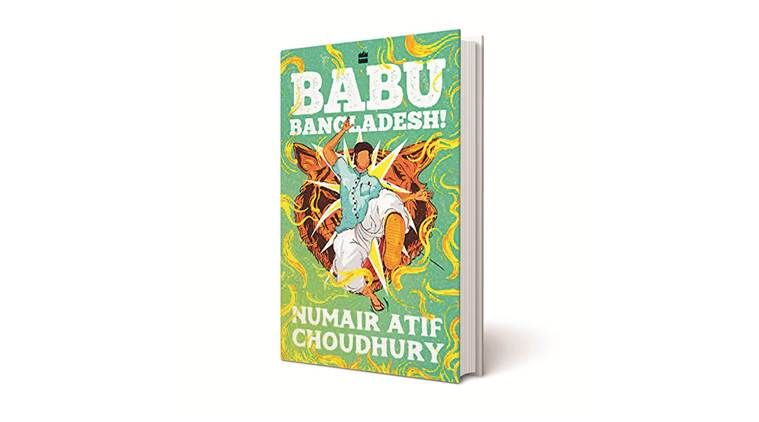
Babu Bangladesh!
Numair A Choudhury
Fourth Estate India
412 pages
Rs 599
It is sometime in the second half of the 2020s. Kamala Harris is President of the US, people eat genetically re-engineered fish — occasionally their organic versions, too — and climate refugees from one part of the world perish in race conflicts in other. Bangladesh is doing its utmost to erase memories of its once-favourite son, Babu. He has been lost to the world for more than five years. Once celebrated by a range of global celebrities including writers, rock musicians, spiritual gurus and environmental and human rights activists, and a cult figure in Bangladesh, Babu is now persona non grata in his homeland. He is said to have been sighted in Argentina, while others say it was a Balinese island or a Mediterranean hamlet. Compounding the enigma is the fact that Babu left behind scarcely any account that would betray his perspective on his disappearance from public view. At such a time, the discovery of a tranche of Babu’s writings and journals is a heaven-sent.
Babu Bangladesh! is an attempt to piece back the life of the prodigal son and re-hyphenate it with his nation. But it’s no hagiography, rather an attempt to remove the mystique around Babu, allay the misgivings about him and reconstruct his life, warts and all. It’s a story entangled in political tumults and ecological upheavals, as well as ministerial assassinations, real estate venality, religious extremism and foreign-aid misappropriation. Babu’s life entwines with the story of the first 50 years of his country. The account of his mercurial rise and fall from grace is also about the emancipatory story of nationalism gone wrong.
Like several nationalists in the subcontinent — and elsewhere — Babu Bangladesh’s characters are capable of gruesome violence, but they also warm our hearts with remarkable generosity. Most of them defy easy slotting as heroes and villains.
However, Babu Bangladesh! is much more than a parable about a nation. In reconstructing the story of a man who was once the face of a generation, Numair A Choudhury, moves seamlessly between myth, history, and reportage. Cyber sabotage is at one piece with environmental activism, folk wisdom exists cheek by jowl with university learning and Yazidi stories blend seamlessly with government espionage accounts. Like its protagonist who resists being typecast as a leftist, environmentalist, a purveyor of the occult or a rational scholar, a welfarist or a face of deceit and venality, Babu Bangladesh! defies genre. To chart Babu’s life and his exit, as Choudhury writes, one must “look into the abyss of human history, into its darkness, its dark green emerald, and into its brilliance and daylight…We will inevitably find ourselves thrashing about in the belly of intimate moments… We will awaken inside desolate crypts populated by forgotten demons that roam untethered. If we are able to bear these most harrowing of reckonings, we will be rewarded with new growths, and peace and light”.
Written as a denouement to the biography, this is also an invitation to look at the life of Babu — and his country — as a mosaic where the realm of facts dissolves into the world of stories and perceptions and the paranormal and the explicable mingle in curious alchemy.
How does one slot a piece of writing which describes how spaces in the modernist architecture of Bangladesh’s Sangsad Bhavan acquire minds of their own to guide Babu in mysterious and sometimes malevolent ways? And how does one categorise a piece of fiction, which, in an instant, moves on to narrate the machinations of a “secular” politician who schemes with the fundamentalist HUJI in a futile attempt to pull down a red-light area? How does one describe an author who gives a patient ear to the conflicting narratives about Babu’s role in the raid on brothels and does not privilege any one in his final piece?
Or a plot that eschews linearity for most part but takes recourse to this modernist technique when describing Bangladesh’s ecological tragedy? Choudhury’s prose matches the breathtaking natural beauty of Bangladesh. Babu, for all his erudition and appearances at hallowed environmental conferences, is more a receiver of ecological wisdom than an activist of fixed ways — as a pre-teen with a slingshot, he learns the ethics of hunting from his parents, he never imposes himself during sessions with aid honchos about community management practices and takes pains to appreciate the water wisdom of people in his country. And, there is no hyperbole when Bangladesh is overtaken by climate change — for most part, the silences are stunning.
Babu Bangladesh! is one of those first works of fiction that make the reader agog about the writer’s next offering. Alas, Numair A Choudhury is no more!